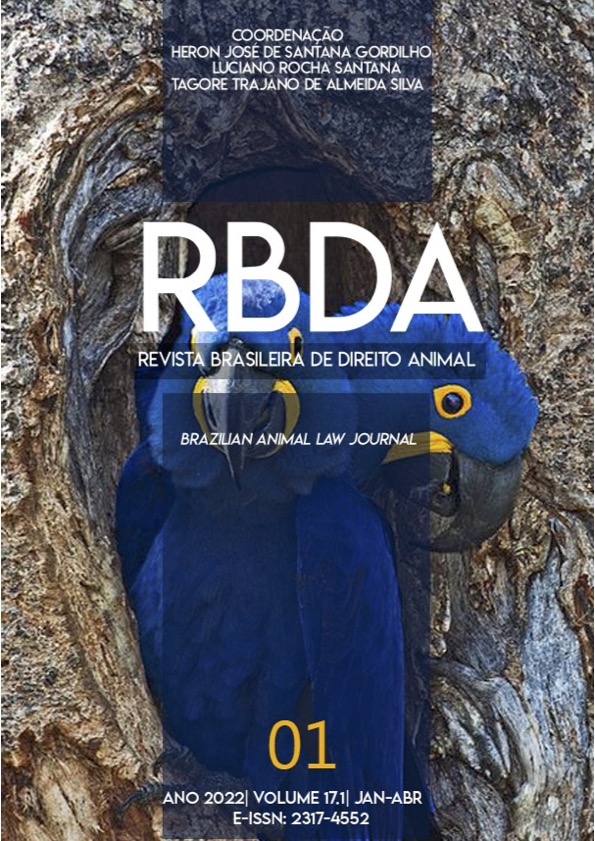A natureza dos animais não humanos e a sua proteção jurídica
DOI:
https://doi.org/10.9771/rbda.v17i0.48012Abstract
Through an exploratory investigation, based on a qualitative methodology with bibliographic research, this article analyzes the grounds that justify the necessary legal protection of the interests of non-human animals. The subject ordinarily involves the question of the legal nature of these animals. Therefore, it is necessary to analyze the language of Law to note that your concepts are usually stipulations that don't depend on the ontological characteristics of the classified objects. The problem is whether the effective legal protection of these animals depends on their subordination to the category of persons. The hypothesis is that the protection doesn't depend on which legal category non-human animals are framed. They are entities that deserve dignified treatment because it is an ethical imperative that stems from the need for men to avail themselves of that relationship as an environment that provides them with the opportunity to exercise a virtuous and, therefore, meaningful life, thus promoting their moral development.
Downloads
References
ARISTÓTELES. Política. Madri: Gredos, 1988.
ARISTÓTELES. Ética nicomáquea. Madri: Gredos, 2008.
BENTHAM, Jeremy. Introduction to the principles of morals and legislation. Londres: Printed for W. Pickering, Lincoln's-Inn Fields, v. II, 1823.
BRASIL. Código Civil. Brasília: Senado Federal, 1988. Disponível em: http://www.planalto.gov.br/ccivil_03/leis/2002/l10406compilada.htm. Acesso em 04 jan. 2022.
BRASIL. Constituição Federal. Brasília: Senado Federal, 1988. Disponível em: http://www. planalto.gov.br/ccivil_03/Constituicao/Constituiçao.htm. Acesso em: 04 jan 2022.
CARRIÓ, Genaro R. Notas sobre deerecho y lenguaje. 4. ed. Buenos Aires: Abeledo-Perrot, 1994.
CONSELHO FEDERAL DE MEDICINA VETERINÁRIA (CFMV). Resolução nº 879. Brasília, 2008. Disponível em: http://ts.cfmv.gov.br/manual/arquivos/resolucao/879.pdf. Acesso em: 04 fev. 2022.
CONSELHO FEDERAL DE MEDICINA VETERINÁRIA (CFMV). Resolução nº 1236. Brasília, 2008. Disponível em: http://ts.cfmv.gov.br/manual/arquivos/resolucao/879.pdf. Acesso em: 04 fev. 2022.
DESCARTES, René. Discurso do método. 2. ed. São Paulo: Martins Fontes, 2001.
DESCARTES, René. O Mundo (ou Tratado da luz) e O homem. Campinas: Unicamp, 2009.
GUIBOURG, Ricardo; GHIGLIANI, Alejandro M.; GUARINONI, Ricardo V. Introducción al conocimiento científico. Buenos Aires: Eudeba, 1984.
KANT, Immanuel. Fundamentação da metafísica dos costumes. 2. ed. Lisboa: Edições 70, 2007.
MESQUITA, Anne; PELLENZ, Mayara. Contra-Especismo: argumentos éticos, filosóficos e jurídicos em favor dos animais. Erechim-RS: Deviant, 2019.
OAB-GO, CEPDA. Manual de direito animal. Goiás: OAB, 2021. Disponível em: https://www.oabgo.org.br/arquivos/downloads/direito-animal-finalizac807-a771-o-2021-1-3914103.pdf. Acesso em: 3 jan 2022.
PARAÍBA. Código de Direito e Bem-Estar Animal. João Pessoa: ALPB, 2018. Disponível em: http://static.paraiba.pb.gov.br/2018/06/Diario-Oficial-09-06-2018.pdf. Acesso em 06 fev. 2022.
RAMMÊ, Rogério S. Especismo e esquizofrenia moral na tutela jurisdicional dos maus-tratos a animais: uma mirada jurisprudencial. In: SCHEFEER, Gisele K. Direito animal e ciências criminais. Porto Alegre: Canal Ciências Criminais, 2018. Cap. 11.
REALE, Geovanni. História da filosofia antiga: Platão a Aristóteles. 2. ed. São Paulo: Loyola, v. 2, 2002.
ROCHA, Ethel M. Animais, homens e sensações segundo Descartes. Kriterion, Belo Horizonte, v. 45, p. 350-364, dez 2004.
RODRIGUES, Fernando A. D. R. Ética do bem e ética do dever. In: CUNHA, Ricarlos A. V. Filosofia e direito: ética, hermenêutica e jurisdição. Espírito Santo: JFES, 2014. p. 81-106.
SEDGWICK, Sally. Fundamentação da metafísica dos costumes: uma chave de leitura. Petrópolis: Vozes, 2017.
SINGER, Peter. Ética prática. 3. ed. São Paulo: Martins Fontes, 2002.
TUGENDHAT, Ernst. Lições sobre ética. 7. ed. Petrópolis: Vozes, 2009.
Downloads
Published
How to Cite
Issue
Section
License
Copyright (c) 2022 Brazilian Animal Law Journal

This work is licensed under a Creative Commons Attribution-NonCommercial 4.0 International License.
1. Autores mantém os direitos autorais e concedem à revista o direito de primeira publicação, com o trabalho simultaneamente licenciado sob a Licença Creative Commons Atribuição 4.0 Internacional que permite o compartilhamentodo trabalho com reconhecimento da autoria e publicação inicial nesta revista.
2. Autores têm autorização para assumir contratos adicionais separadamente, para distribuição não-exclusiva da versão do trabalho publicada nesta revista (ex.: publicar em repositório institucional ou como capítulo de livro), com reconhecimento de autoria e publicação inicial nesta revista.
3. Autores têm permissão e são estimulados a publicar e distribuir seu trabalho online (ex.: em repositórios institucionais ou na sua página pessoal) a qualquer ponto antes ou durante o processo editorial, já que isso pode gerar alterações produtivas, bem como aumentar o impacto e a citação do trabalho publicado.












